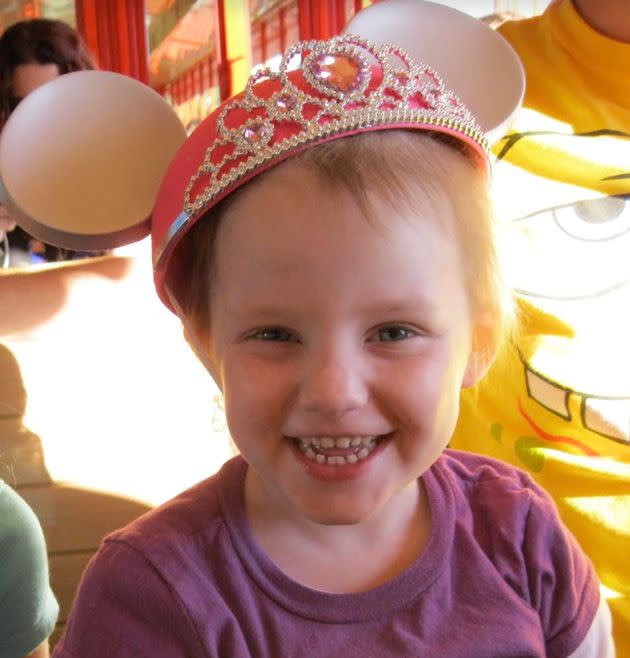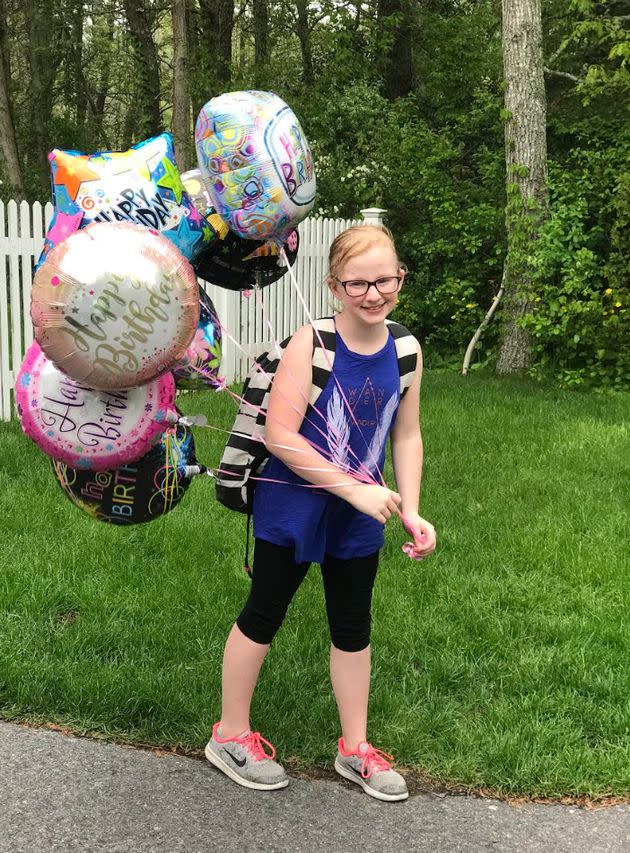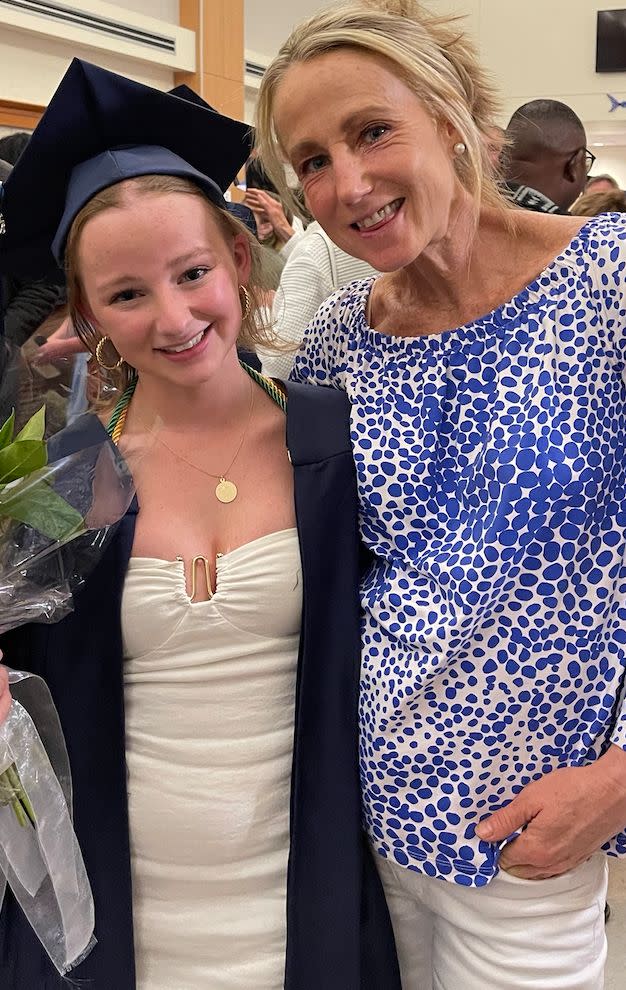I'm The Mom Of A Cancer Survivor. There’s 1 Word Other Parents Use That I’ll Never Use Again.

Emily on her first day of kindergarten in 2010
I put my daughter on the kindergarten bus in 2009. A week out of treatment for high-risk cancer, she had hearing aids, leg braces, sparse hair, endocrine issues and kidney damage. As the bus pulled away, I stood at the end of my driveway. We’d made it.
For 18 months, the first day of kindergarten had been our North Star. We cuddled in Emily’s hospital bed, chatting about the details of that upcoming day, which, when it finally arrived, included a pink rolling backpack, two packages of Barbie gummies in her Dora lunch box and sneakers that lit up.
While teary-eyed moms posted selfies at the bus stop, I sat in my car and sobbed ― not because I was sad, but because I was overwhelmed by relief, joy and gratitude. My heart didn’t ache for the past, my heart burst for the present. Emily was on a bus going to school.
The milestone reassured me she was OK, I was OK and life was OK ― at least for now.
During the first week of school, Emily became obsessed with mastering the monkey bars and asked me to sign her up for soccer. She balanced on her tippy toes, the cords of her heels atrophied from being in bed so long. I worried she’d fall and get hurt, yet seeing her in an orange jersey on a field of grass made me cheer on the sideline with everything I had.
Less than a year before, Emily was fighting for her life during back-to-back stem cell transplants. Now she was high-fiving her friends after a game. We stopped for pizza to celebrate. From the pediatric oncology floor, everyday life moments like these were the things I missed most.

The author and Emily at Disney World in 2010 for her Make-A-Wish vacation
Still, Emily’s health continued to inform our days. She needed occupational therapy, physical therapy, speech therapy and a reading tutor. She protested early dismissals for doctor’s appointments. “I can’t miss any more school!”
It was as though she had an agenda and timeframe. And maybe she did, because by the end of kindergarten, she could read, scale the monkey bars and didn’t need her leg braces anymore. My worries about her not making friends were replaced by a daily report of which snack she had swapped with her friends during lunch.
For five years after her treatment, I held my breath waiting for Emily’s remission mark. The uncertainty made me miserable. If Emily had a headache, I immediately thought the cancer was back. I joined a neuroblastoma parent Facebook group and then unfollowed the group because too many of their kids died, which sent me into a tailspin for days.
I thought the angst would go away when Emily was officially in “remission,” but it didn’t. I longed to speak with certainty about her future like other moms did about their kids. They laughed about shipping their kids to college early, but I wasn’t even sure we’d make it to middle school.
The highs of typical kid milestones and the lows of collateral cancer damage left me exhausted. Elementary school talent shows, band concerts, the school state fair, summer camp and sleepovers had the power to take me down almost as much as waiting on an MRI for unexplained shading on her lungs. Extreme joy and extreme grief coexisted in a way I didn’t ever know they could.

Emily celebrates her 10th birthday.
Most of the time, the good moments sustained me. We threw a surprise party on Emily’s 10th birthday and drove her to meet her friends to see a movie unsupervised for the first time.
Other parents referred to these moments as “bittersweet.” But I couldn’t find anything bitter about them. That’s a word I would never use ― it felt wrong to me. Emily was alive and thriving. I felt like I lived in an alternate universe where the past was bitter and the present was sweet.
Yet as she aged, the physical differences between Emily and her friends became notable. In bed at night, I wondered if she’d live to go to the prom and get her license, and if she did, what those moments would look like. The treatment stunted her growth and stole her estrogen, so she needed to wear an estrogen patch for her body to develop. The fake period was a bonus, her endocrinologist said. “It will make her feel more like her friends.” But it took a while to work.
A few weeks before a middle school dance, Emily and I walked around the mall for hours trying to find a dress that fit and wasn’t from a children’s clothing store. On the way home, we cried, defeated. But the next day, we rallied and went to a fancy store in town that made the same prints for women and kids so her friends couldn’t tell her dress was a kids’ size.
On dance night, I morphed into the paparazzi. “No more pictures,” Emily snapped. After I dropped her off, I called my sister. “She’s there! She’s at the freaking middle school dance!” Often, the good, somewhat ordinary moments threw down a challenge to get there, but when they arrived, they sparkled in technicolor.
“We did it!” became my mantra for every measure, big and small, though I didn’t dare say it aloud for fear of jinxing our progress. Emily and I were a team. I set up the ball, and she kicked it over and over, even though she refused to acknowledge our partnership in her teenage years.

The author with Emily on high school graduation night
When Emily went to high school, my mind struggled to wrap itself around the idea that she was alive to experience things I had only dreamed about. The stakes felt higher. She challenged herself with high-level classes and practiced her lacrosse skills in the backyard so her ball work skills would make up for her lack of size.
Over the past few years, I’ve watched moments materialize that had once only been flashes in my mind. She got her license with help from special car modifications so she could reach the gas pedals. Her prom dress wasn’t from a children’s shop, it just needed alterations. She’s leaned on TikTok for strategic hairstyles and makeup tips to look older.
For months, I’ve listened to parents of graduating seniors who are in awe that it’ll all be over soon. The days of active parenting will be behind us. It will crush them and make them long for the good ol’ days of cuddling before bedtime. I nod my head.
But I’m not in awe that it’s over; I’m in awe that it happened: all the unpromised moments and milestones we take for granted until something threatens to take them away.
If cancer gave me anything, it’s perspective. To know the little moments are the big moments. And that the milestones along the way remind us that our child is OK, we are OK and life is OK. For us, there is no bitter ― only sweet. We’ve inched our way to the place we’ve been heading since we put our kid on the bus 12 years ago. The reality of its arrival is a wonder.
Amy McHugh is a freelance writer on Cape Cod. Her writing has appeared in The Washington Post, Oprah Daily, NBC News and Shondaland. She is writing a memoir about parenting, mental health and new beginnings. You can see more of her work at www.amymchughwriter.com.
Do you have a compelling personal story you’d like to see published on HuffPost? Find out what we’re looking for here and send us a pitch.

